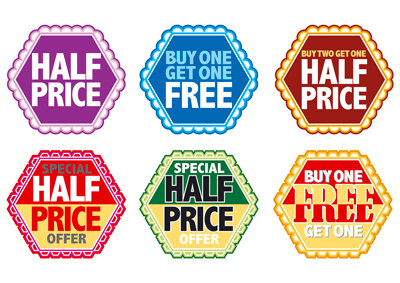Price and value can sometimes get confused. Retailers will often tell us that low prices translate to great value. But that, is very much a matter of opinion and perspective.
One of the best-known quotes regarding price and value comes from investing legend, Warren Buffet:
“Price is what you pay, value is what you get”
The quote is set in the context of investing into companies around the world. But the message is just as relevant to the spending decisions you make with day to day finances.
Beware of ‘special offers’

Clever marketing can often blur the lines between price and value. Advertising and retail techniques can make us think that something is great value. Sometimes adverts will create a sense that we need a product or service to make our lives easier or happier. Think about some of the TV ads for cleaning products.
Other times, the focus can be on low prices to make us think that we’re getting a bargain. These can often involve an element of scarcity i.e limited time offers such as “buy now while stocks last”.
Cheap bargains do not necessarily translate to good value. Supermarkets are well known for ‘BOGOF’ deals and other incentives. But if we don’t really need the stuff, or, if we end up not using it at all, can it really be good value?
Value is the benefit we derive from a product or service. It cannot really be determined in terms of money and it varies from person to person.
If you take out a gym membership with a 50% discount, you might think “great, I got a bargain there”. But whether or not that translates to good value depends on how much you actually use the facility and how it makes you feel.
Price, cost and value
Retailers will often used a technique called ‘anchoring’ to help create the illusion of a bargain. If you see a suit in a shop, with a discount sign offering 70% off, your buying decision can be ‘anchored’ to the original price, for example £1,000.
£1,000 might feel excessive for a suit, but if it was discounted to £300, it comes across as being on sale for a amazing price. But rather than focus on the ‘saving’ of £700, you should focus on whether you would gain £300 worth of value from the purchase.
If the suit’s a bit uncomfy or doesn’t fit properly, then it’s probably not much of a bargain.
Remember, it’s entirely up to retailers and service providers how they set a price. They need to make sure it covers all their costs otherwise they won’t be in business for long.
So if you see goods and services with a price that appears to be cheap, don’t automatically assume it’s good value. The price just reflects the policy of the seller.
When it comes to value, that’s personal to you. Don’t let anyone else tell you something is great value – only you can decide that.
This table may help to summarise these key points:
| Basis for Comparison | Price | Cost | Value |
|---|---|---|---|
| Definition | The amount paid for a product or service | The amount incurred in creating the product or service | The benefits (utility) gained from the product |
| Who is affected? | The purchaser / consumer | The producer / seller | The user |
| Calculated By? | Pricing policy | Fact | Opinion |
| The role of money? | Calculated in terms of money | Calculated in term of money | Not calculated in terms of money |
How to focus on value, rather than price or cost
Try following these suggestions to help maximise value from your spending choices:
- Ignore the amount of discount or saving being offered. Look only at the actual sale price and ask yourself if you will really use the product or service enough to get your money’s worth.
- Write a shopping list and don’t get distracted by offers for things you don’t need. Only buy what you set out to buy.
- Think about your own values when choosing which businesses to support. For example, if you value the environment, think about the carbon footprint of products. Will you pay a lower price for goods that have travelled across the world, or will you gain more satisfaction by paying a higher price for goods that are local?
The price and value of financial expertise
Financial advice and wealth management will normally be priced as a percentage of your invested wealth. The fees are usually deducted from your investments, so you don’t get that feeling of handing money across. It might even feel as though the advice is included, as part of the investment management fee.
On the other hand, financial coaching (and sometimes financial planning) is costed on a flat fee basis. What you pay is much more visible and you need to actually ‘hand the money over’ one way or another.
However you pay for financial expertise, be sure to understand the price and then you can determine the value.
Remember that financial coaching will normally be less expensive than than regulated financial advice, but that doesn’t necessarily mean it’s better value. It all depends on the value you derive. Coaching and advice are two very different things.
What you get out of coaching will depend on what you put in. So although the price could be lower, it might not deliver value if you’re unable or unwilling to learn and take action.
On the other hand, if you want the confidence and knowledge to take control of your own money and life decisions, you could find that coaching is transformational and truly priceless.
For more information about whether financial coaching could be a good fit for you, see my earlier blog here.




 Production
Production
